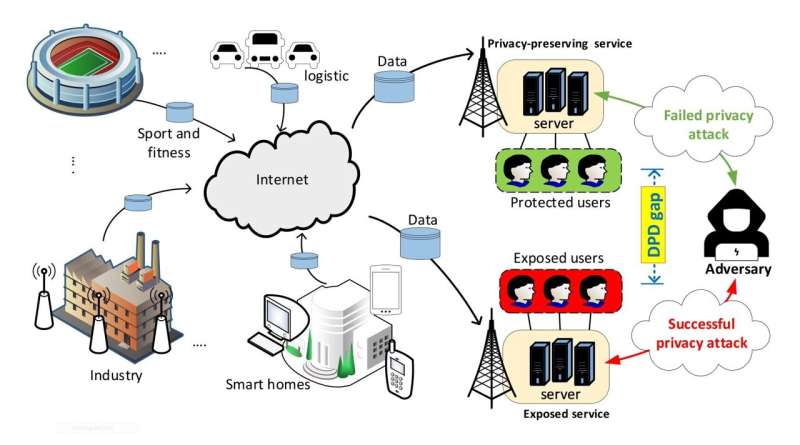[ad_1]
February 21, 2022
function

Figure showing the digital privacy divide between protected and unprotected users. Credit: Alhazmi, Imran and Alsheikh.
As information and communication technology (ICT) systems proliferate, it is important to consider and protect user privacy. Although there are many ways to protect users’ digital privacy, such as network security measures, cryptography, and access control strategies, these methods are not implemented equally in all countries around the world.
Researchers at the University of Canberra in Australia recently conducted a study examining the factors that determine this global digital privacy divide. Their findings, published in IEEE accesshighlight several social and demographic trends that affect how digital privacy measures are implemented around the world.
“Our team has been investigating digital privacy since 2016,” Mohammad Abu Alsheikh, one of the researchers who conducted the study, told TechXplore. “This recent work was inspired by the disparity we observed in the digital privacy protections afforded to users based on their geographic location.”
Over the past few decades, regions and countries around the world have introduced various policies and regulations aimed at protecting the digital privacy of Internet users. These include, for example, the General Data Protection Regulation (GDPR), which protects the privacy of users in European Union (EU) countries, and the California Consumer Privacy Act (CCPA), which only applies to services and users in California.
These rules force online platforms, services and technology companies such as Google, Facebook and Twitter to follow certain rules that protect the privacy of their users. These policies allow people in different locations to use online services in different ways, such as viewing cookie consent pop-ups in different formats or receiving additional privacy-related notices.
To explore the socio-demographic patterns that drive these differences in online privacy, Alsheikh, along with his colleagues Hamoud Alhazmi and Ahmed Imran, asked 776 participants in different countries to complete an online survey. These participants were recruited through manual referrals and through the Amazon Mechanical Turk (MTurk) platform.
“We then used statistical analysis tools to verify the data collected and found that the survey conducted met strict internal consistency reliability,” Alsheikh said. “We then used statistical methods to examine the relationship between users’ socio-demographic patterns and their perceptions of privacy.”
The analysis by this team of researchers produced some very interesting results that highlight the extent to which digital privacy has recently led to significant inequality. Specifically, they found that younger users (ages 15 to 32) are more concerned about their digital privacy than older users (ages 33 and older).
Additionally, their study found that users’ ethnicity, occupation, and level of higher education had minimal influence on users’ perceived digital privacy gap. In the future, the results obtained by Alsheikh and his colleagues may inspire new strategies to reduce the digital privacy divide around the world.
“We believe that digital privacy is a fundamental human right,” Alsheikh added. “Accordingly, we are calling for unified digital privacy rules that will protect users regardless of their country of residence. We will now work on expanding the research to examine the relationship between the digital privacy protections afforded to users and their vulnerability to online misinformation campaigns.”
WhatsApp updates privacy in line with Ireland ruling
Hamoud Alhazmi et al., How Do Socio-Demographic Patterns Define the Digital Privacy Divide?, IEEE access (2022). DOI: 10.1109/ACCESS.2022.3144436
© 2022 Science X Network
Citation: Study Shows Online Privacy Has Caused Inequality (2022, February 21) Retrieved October 31, 2022, from https://techxplore.com/news/2022-02-online-privacy-inequality.html
This document is subject to copyright. Except for any honest work for the purpose of private study or research, no part may be reproduced without written permission. The content is provided for informational purposes only.
[ad_2]
Source link
